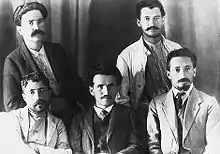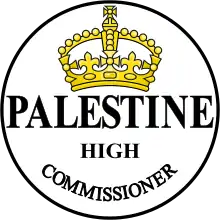Jewish National Council
The Jewish National Council (JNC; Hebrew: ועד לאומי, Va'ad Le'umi), also known as the Jewish People's Council was the main national executive institution of the Jewish community (Yishuv) within Mandatory Palestine, responsible for education, local government, welfare, security and defense.[1]
| Jewish National Council | |
|---|---|
| הוועד הלאומי | |
| Overview | |
| Established | 1920 |
| State | Yishuv, Mandatory Palestine |
| Leader | president of the council |
| Responsible to | Assembly of Representatives |
History
The JNC was established in 1920, the same year as the Histadrut and the Haganah were founded, in order to conduct Jewish communal affairs. Its first chairman was Rabbi Abraham Isaac Kook. Jewish communal affairs were generally conducted through a hierarchy of representative organizations, including the JNC. Another of these organizations was the Assembly of Representatives (Mandatory Palestine), which had three hundred members who selected from among themselves the members of the National Council.[2]

The members of the JNC also participated in meetings of the Zionist General Council. The organization represented almost all major Jewish factions, however a few smaller groups at first objected to the creation of centralized leadership. Notably, Agudat Israel joined only in 1935. It was announce only in 1946 that the Sephardic Jews and the Zionist Revisionists, would stop refusing to participate in the JNC.[3]
Role in the establishment of Israel
The Political Department of the JNC was responsible for relations with the Arabs, ties with the Jewish Agency and negotiations with the British government. As the yishuv grew, the JNC adopted more functions, such as education, health care and welfare services, internal defense and security matters, and organized recruitment to the British forces during World War II. In the 1940s, departments for physical training, culture and press and information were added.
The report of the Anglo-American Committee of Inquiry issued in 1946, stated:
"The Jews have developed, under the aegis of the Jewish Agency and the JNC, a strong and tightly-woven community. There thus exists a virtual Jewish nonterritorial State with its own executive and legislative organs..."[4]
When the State of Israel was established in 1948, this departmental structure served as a basis for the government ministries. On March 2, 1948, the New Jewish Council:
" begins work on organization of Jewish provisional government" [5]
On May 14, 1948, (the expiration day of the British Mandate), its members gathered at the Tel Aviv Museum of Art and ratified the proclamation declaring the establishment of the State of Israel. The members of the JNC formed the provisional government of the nascent State of Israel.
Departments
- The Political Department
- The Education Department
- The Health Department
- The Communities Department
- The Rabbinate
- The Social Welfare Department
Presidents
- 1920–1929 David Yellin
- 1929–1931 Pinhas Rutenberg
- 1939–1944 Yitzhak Ben-Zvi
- 1944–1948 David Remez
References
- The origins and challenges of Israeli democracy Haaretz, 3 October 2014
- Cleveland, William L., and Martin P. Bunton. A History of the Modern Middle East. Boulder: Westview, 2013. 232. Print.
- JTA.org. Arab Mayor of Hebron Submits Petition to Transjordan Ruler Asking “anschluss” April 22, 1946
- The report of the Anglo-American Committee of Inquiry Ch. VIII. The State Within the State.
- Nanette Dobrosky (1987). "Palestine Israel US State Department Records". University Publications of America. p. 37. Retrieved October 25, 2011.
External links
| Wikimedia Commons has media related to Jewish National Council. |
